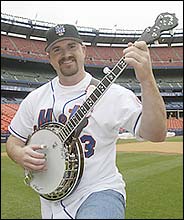Ginter Is Making Mets His Old Kentucky Home
Ginter Is Making Mets
His Old Kentucky Home
By LEE JENKINS
Published: June 15, 2004

Matt Ginter strums a banjo on the Mets' team plane, watches hunting DVD's
in the clubhouse and prepares for a start by thumbing through catalogs
advertising the latest in Buck knives.
In Kansas City last weekend, he took the Mets' strength coaches to the
rodeo one night. The next morning, he took a fellow pitcher to a hunting
and fishing warehouse. Now that the Mets have returned to New York, Ginter
excitedly awaits the arrival of his bow and arrows, which he spends much
of the off-season shooting on his farm in Winchester, Ky., a town of about
16,000 located in the hills near Lexington
It is difficult to say where exactly Ginter is going to shoot the arrows
this summer, since he is living in a hotel in Queens.
Ginter has taken the subway a few times since moving to New York, but he has repeatedly wound up traveling in the wrong direction. "I'm just learning how this city life works," he said.
Ginter has provided the Mets a little comfort in what appears to be their roughest patch of the season. Playing his own version of country hardball, Ginter has become the surprise of a starting rotation that is itself the surprise of the major leagues. For all that has gone wrong for the Mets recently - namely, hitting and defense - their pitchers lead the majors in earned run average (3.61), and Ginter (2.43) has allowed only three runs in his past 22 2/3 innings.
Ginter has joined the veteran starters Al Leiter, Tom Glavine and Steve Trachsel, even though he is really nothing like them. Leiter is a 38-year-old from New Jersey who seems just as comfortable in a suit as in a uniform. Glavine is a 38-year-old two-time Cy Young Award winner from near Boston who would have played hockey if it were not for baseball. And Trachsel, 33, is a wine connoisseur from Southern California who has never fired a gun.
Yet, on the first day that Ginter asked teammates if it was all right to play a hunting video in the clubhouse, Trachsel sidled up next to him. He also tags along when Ginter goes shopping for hunting supplies or camouflage.
"You get him talking about that stuff," Trachsel said, "and he'll go on forever."
Relief pitcher Dan Wheeler said of Ginter: "I hear him sometimes and I'm like, 'Ohh-kay.' I can't begin to understand what he's saying."
With Ginter's arrival, the Mets' pitching coach, Rick Peterson, has developed an interest in archery. Ginter has been hunting deer with his bow and arrows since he was 15, and he has developed such keen marksmanship that he can split a deck of cards with an arrow. Ginter told Peterson that when shooting an arrow, he always focuses on a spot no larger than a nickel. But when throwing a baseball, he aims at a much larger target.
Ever since, Peterson has instructed Ginter to treat the mound like his farm and the baseball like his arrows, aiming at a small circle. Whether a coincidence or a consequence, Ginter's control has been uncanny, with 7 walks, 15 strikeouts and 30 hits in 33 1/3 innings.
"That was my whole problem," he said. "I was focusing on a spot way too big. Now I'm narrowing my focus. I'm making my target just as small as I do with my bows."
Ginter's road to Shea Stadium can sound like a self-written country song. He went into spring training as a relief pitcher for the White Sox, then was traded to the Mets for Timo Perez and converted into a starter. When he was called up from Class AAA Norfolk last month for a spot start, his luggage was lost on the way to Houston and he found himself facing Roger Clemens.
Unfazed, Ginter managed the first hit of the game off Clemens, and the Mets beat the Astros in extra innings. In five of his six starts, Ginter has allowed two runs or fewer. But he has only one decision, a victory that resulted from his worst outing. In recent months, General Manager Jim Duquette has made a handful of low-profile moves that yielded high-end results; Ginter could be the most lopsided acquisition of all.
He is making an impact on the Mets, who view him with amusement and delight. Closer Braden Looper calls Ginter "our country boy," and compares him to the Clampetts, the family from "The Beverly Hillbillies." Catcher Vance Wilson calls him "our redneck," but he insists he is using the term endearingly. When reliever David Weathers wants instant entertainment, he summons Ginter to review an episode of "Hee-Haw."
"Me and him understand each other," said Weathers, who is from Tennessee. "When one of us is talking, we don't have to say, 'Huh?' "
As Ginter looks around the clubhouse at Kazuo Matsui of Japan, Jae Seo of South Korea, Karim Garcia from Mexico and Cliff Floyd of Chicago, he is struck by how many races and nationalities are represented on a baseball team. "It's the great thing about this game," Ginter said. "You meet people from everywhere. You get to see the whole world."
Ginter is more than willing to share a piece of the bluegrass where he was raised. His banjo case, adorned with a John Deere sticker, is already a clubhouse fixture. On the way home from a trip, Ginter takes song requests from teammates. Sometimes, they want to hear something by Cripple Creek, sometimes Lynyrd Skynyrd. But Ginter often ends with the tunes that remind him of his Kentucky home.
"I do miss it," he said. "But I try to take some of it with me wherever I go. I'll listen to my bluegrass, no matter what anyone says. I won't change just because I'm in the big leagues now."